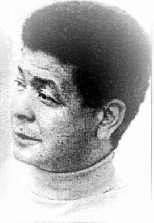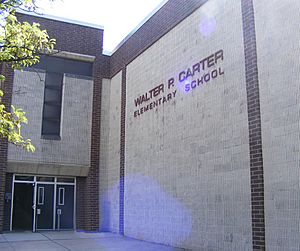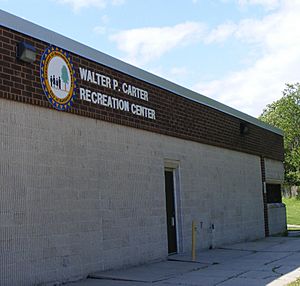Walter P. Carter facts for kids
Quick facts for kids
Walter P. Carter
|
|
|---|---|
 |
|
| Born | April 29, 1923 |
| Died | July 31, 1971 (aged 48) |
| Alma mater | North Carolina A&T |
| Organization | Congress of Racial Equality, Student Nonviolent Coordinating Committee, |
| Movement | Civil Rights Movement |
Walter Percival Carter (born April 29, 1923 – died July 31, 1971) was an important activist in Baltimore, Maryland. He played a big role during the Civil Rights Movement. He became well-known for organizing protests against unfair treatment across Maryland.
Carter is most famous for leading the Baltimore chapter of the Congress of Racial Equality (CORE) from 1960 to 1963. He also helped organize the 1963 March on Washington for Maryland. Many places in Baltimore, like a hospital, a school, and a recreation center, are named after him to honor his work.
Contents
Walter Carter's Early Life
Walter Carter was born in Monroe, North Carolina. He was the seventh of nine children. He went to North Carolina A&T, where he earned his first college degree. While there, he helped people register to vote and was part of the debate team.
He was known for being very smart and having a great sense of humor. Later, he earned a Master's Degree in Social Work from Howard University. During his time at Howard, he became friends with a young man named Stokely Carmichael, who also became a famous civil rights leader.
Fighting for Civil Rights
Walter Carter was a veteran of World War II. After the war, he worked to help people register to vote in the Southern states. As the leader of CORE in Baltimore, he helped plan the 1960 Freedom Rides. These rides challenged unfair rules at places like restaurants and hotels.
In 1963, he helped organize the huge March on Washington. In 1965, he also helped lead a march of over 3,000 people. This protest was against unfair housing rules that kept Black people from living where they wanted.
Helping Others: The William L. Moore Foundation
In 1963, Carter started the William L. Moore Foundation. This was in honor of William L. Moore, another CORE activist from Baltimore. Moore was shot and killed while on a solo march in Alabama. He was trying to deliver a letter to the Alabama state Governor.
Fighting for Fair Housing
In 1966, Carter and five other CORE members started a group called Activists for Fair Housing. This group worked to make sure everyone could live where they chose. Because of their efforts, apartment owners in Maryland were forced to open their buildings to all people, no matter their race.
Carter also convinced the Community Chest (now called United Way of Central Maryland) to give money to local Black community groups. He often led protests against unfair housing and bad living conditions for African Americans in Baltimore. He even protested outside the homes of landlords who owned these segregated properties.
Challenges in Public Service
In 1968, Mayor Thomas L. J. D'Alesandro III wanted Carter to lead the Community Action Agency (CAA). This agency helped poor communities. However, the Baltimore City Council voted against Carter's appointment. Some council members, like William Donald Schaefer, thought Carter was "too radical." They felt he would push for changes too quickly.
Because Carter was not approved, many people resigned from their positions in protest. This included 12 members of the Community Action Committee and three leaders from the Urban Coalition, like Parren J. Mitchell.
Walter Carter's Legacy
Walter Carter passed away on July 31, 1971. He was giving a speech at a church meeting in Baltimore. The day before, he had won a court case against a man named Morris Goldseker. Carter had been protesting Goldseker's unfair housing practices. Goldseker was known for charging very high fees to Black families who wanted to buy homes. He also used a trick called Blockbusting to scare white families into selling their homes cheaply. Walter Carter fought against these and other unfair housing practices.
Congressman Parren Mitchell spoke about Carter in the Congressional Record, which is a record of what is said in Congress. He said that Maryland had lost a great civil rights leader. He also noted that many white people recognized Carter's important work for Black identity and awareness.
In 1976, the Walter P. Carter Mental Health Hospital was opened in Baltimore to honor him. Although that hospital closed in 2009, many of its services moved to a new building. This new building was also named the Walter P. Carter Center in 2010.
There is also a day care center, a public school, and a college library in Baltimore named after Carter. Every year, students at the Walter P. Carter Elementary School celebrate "Walter P. Carter Day." They find new ways to remember his important work.
In 2012, a documentary film was made about Carter's fight for human and civil rights. It was called "Walter P. Carter: Champion for Change." In the film, he is called the "Martin Luther King of Maryland."
Walter Carter's Family
Walter Carter married Zerita Joy Richardson Carter in 1954. They were married until his death in 1971. Mrs. Carter was a teacher for young children. She passed away in 2016.
Carter had two daughters. His younger daughter, Jill Priscilla Carter, is a lawyer and a member of the Senate of Maryland. She was elected in 2018. Before that, she served in the Maryland House of Delegates from 2003 to 2016.
His elder daughter, Judith Lynn, is married to Sylvester B. Cox, a judge in Baltimore City. They have two daughters, Lindsey and Erin. Lindsey Carter Cox was named in honor of her grandfather, Walter Carter. She graduated from Howard University. Erin Taylor Cox was a champion volleyball player in 2008 and graduated from Morgan State University.
 | Janet Taylor Pickett |
 | Synthia Saint James |
 | Howardena Pindell |
 | Faith Ringgold |



